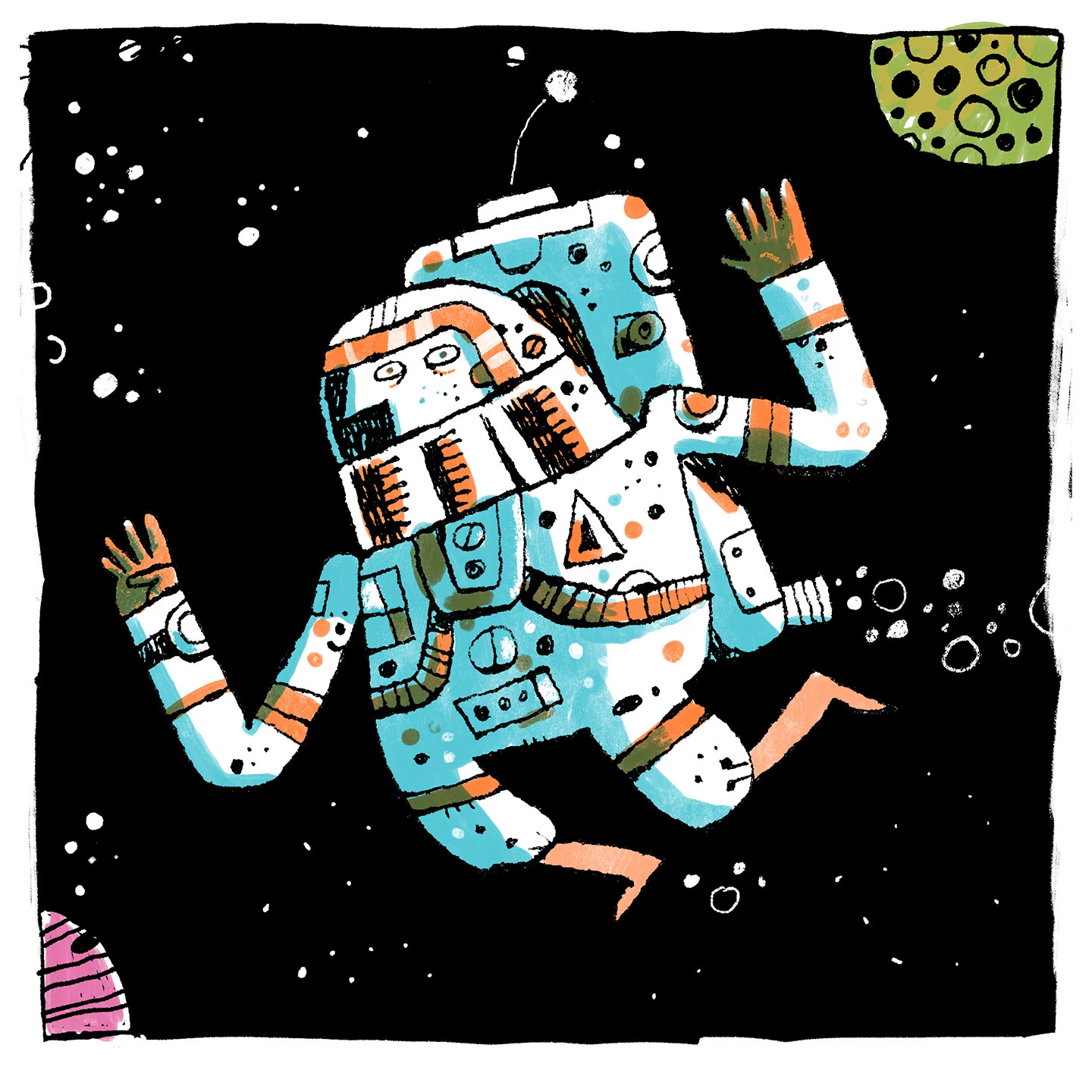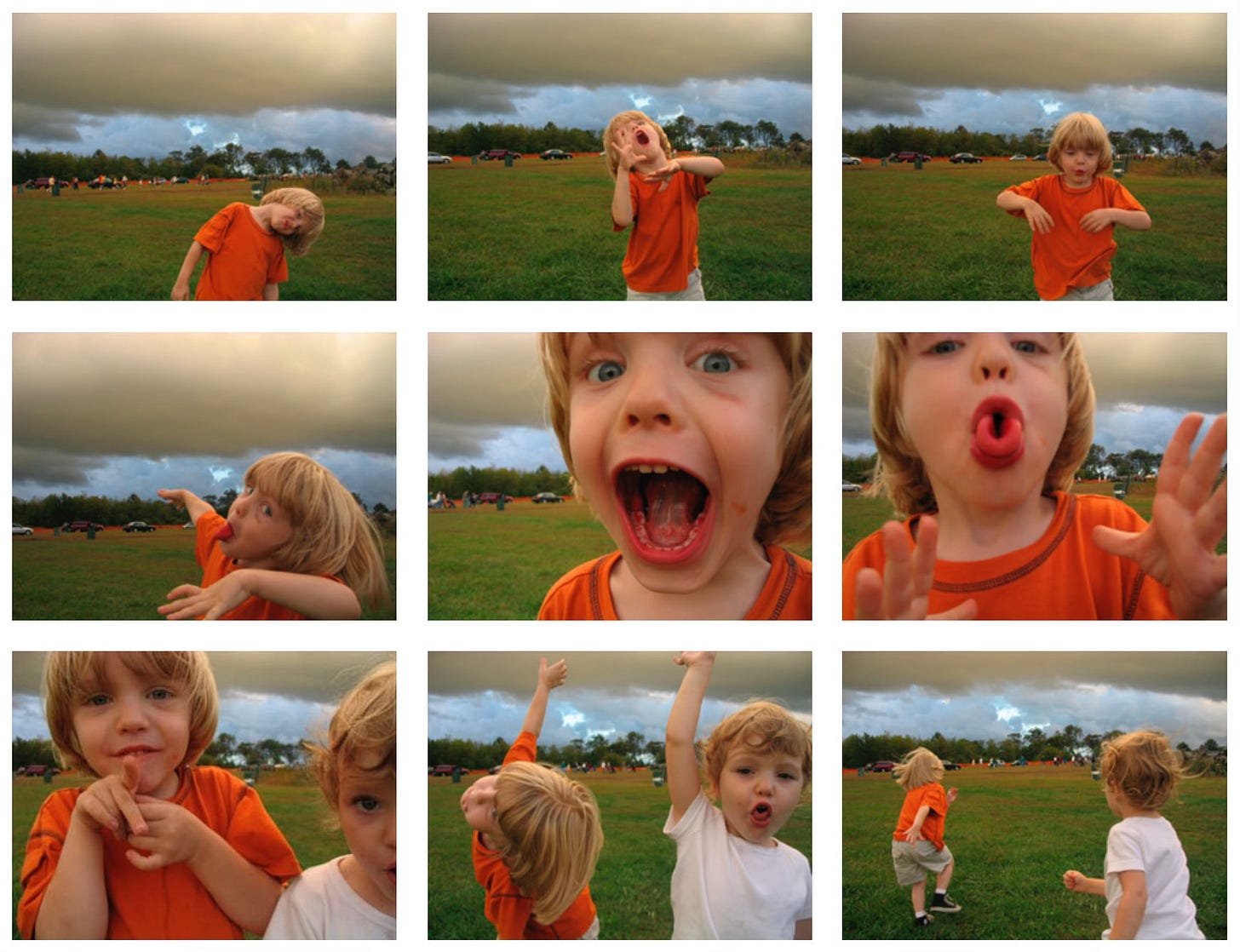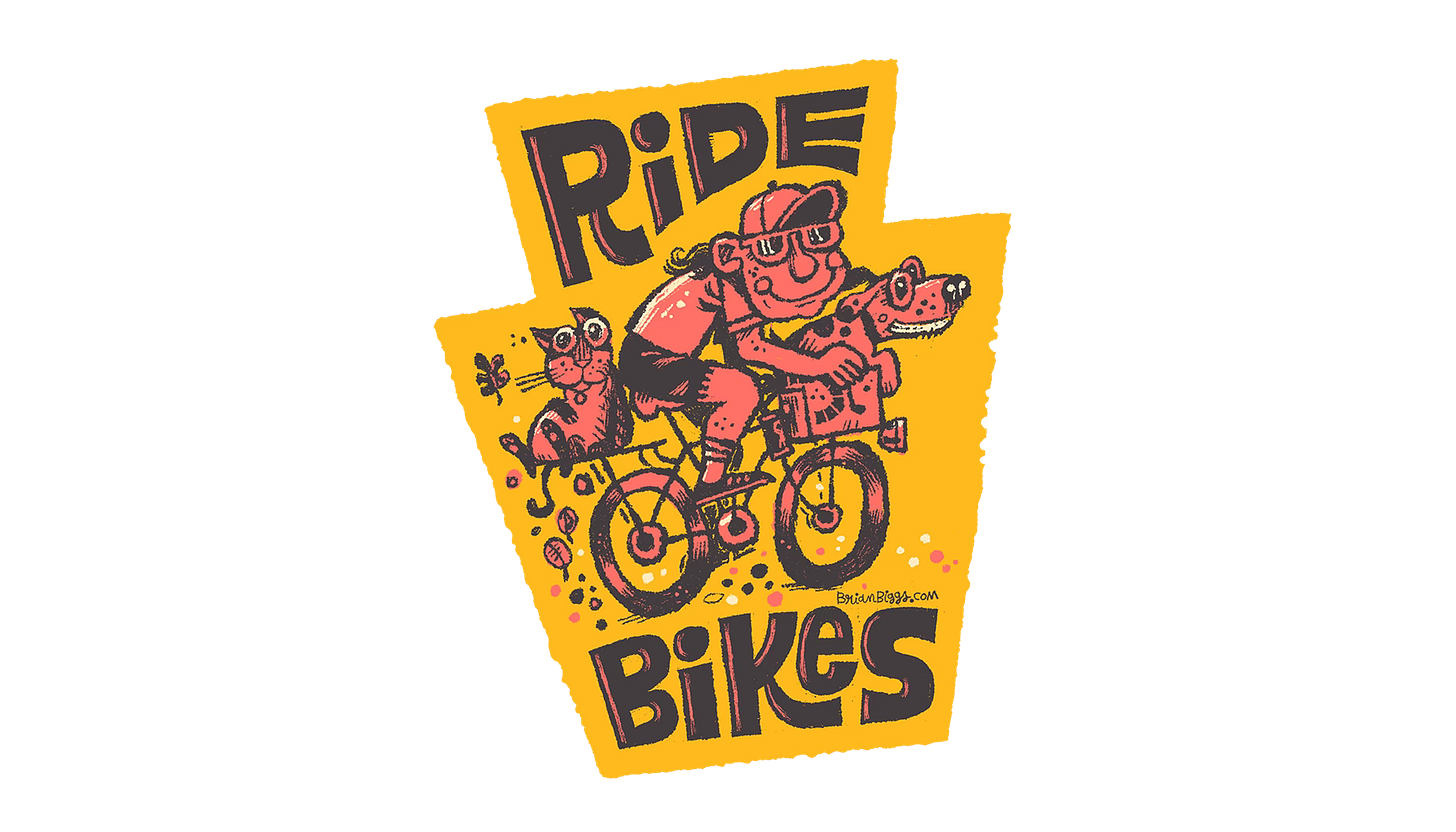a little misunderstanding
where we learn where ideas come from and just wtf is inspiration, anyway
There’s been a lot of ink and pixels spilled for hundreds of years by writers way more talented than me on the idea of inspiration. What it is, what it isn’t, is it even necessary to make art? Until last week, it would never have occurred to me to actually explore this here in Random Orbit. But here we are.
So, what happened last week to change that?
Well, see, I got inspired.
I was interviewed two weeks ago by Giuseppe Castellano for his excellent Illustration Department podcast. We spoke for more than two hours1 and covered a lot of ground. We talked about teaching and the state of art-school education. We talked about anxiety and mental health stuff. We talked about baseball. But the part of the conversation that stuck with me, and has been gnawing at me for two weeks, was when we talked about inspiration.
Giuseppe led this topic by asking a question:
is inspiration actually even necessary for creativity?
He then followed this question with an accusation:
inspiration is really just another word for procrastination.
As I’ve been thinking about this and dwelling on it and talking to friends about it, I’ve some thoughts.
Spoiler alert: the answer, of course, is yes. Yes it is necessary. And as for the accusation, it’s total poppycock.2
I’m not dragging on Giuseppe here. He’s not the first to wonder about the role of inspiration, to give it a skeptical side-eye, and cast aspersions on its usefulness. When he said this in our talk, I was curious where he was going with it, and where he was coming from. He told me a story in which he was, not long ago, planning to start a painting. In order to get some inspiration for this painting, he thought it would be a good idea to visit an art museum. In his anecdote, he doesn’t actually get to the museum, and he comes to realize that the very idea of going to get inspiration in order to begin some creative venture, is actually procrastinating.
At the time that seemed logical, but also not quite right. I mean, we all want inspiration, right? As artists, we long for that moment when the idea for a thing we’re going to make just *pops* into our heads and somehow wiggles its way down from our brains, through our arms, and out of our fingers onto the canvas, or keyboard or whatever tool it is, and then, into the world where it can be enjoyed and applauded by millions of people.
Except, that never actually happens, does it? Whether you’re waiting for inspiration, or you’re at some art museum looking for it, that’s just not how it works.
I don’t go to an art museum to get inspiration. I go because I like looking at art. That’s not to say inspiration doesn’t or can’t happen at an art museum. But it’s as likely to come from overhearing some conversation in the cafe or parking garage as it is from the American Wing or the Modern Gallery. I’m not inspired by art any more than I am from a new pen I just bought, or a tree I happened upon during a walk in the woods. To me, going out to find inspiration isn’t really inspiration at all.
So, what is it, then?
I think inspiration is another word not for procrastination, but for curiosity. This manifests as an expression of one’s curiosity about the world. I know, that sounds like a ridiculous artist’s statement. So let’s put the question to a group of people who are a lot smarter than you and me. Let’s ask a bunch of eight-year-olds.
Where do you get your ideas?
In my day-job as a children’s book writer and illustrator, I’m often given the opportunity to visit schools, where I show my work and talk to students. Students often ask visiting authors where these authors get their ideas, so I actually put this into my presentation.
I write about, and draw, some far-out things, like robots and space ships and talking bugs. But I always try to ground these things in the world that kids live in and understand. So, in my astronaut book, my astronaut who is bored with his astronaut-tasks and staring, literally, out into space, is really just a little boy who wants to get outside and play. In my super-hero book, Abigail, my super-hero, is annoyed at her father for not listening to her and for not taking her seriously. She allows3 a giant octopus to kidnap her dad and then proves herself by rescuing him.
As I’m talking about this to the students, I show pictures on a screen behind me of things that have inspired my drawings and books. These are pictures of various toy robots and spaceships that I have in my studio, pictures of dinosaurs, and of bicycles. And I show pictures of my two kids, from back when they were actually kids.4
These pictures always get a laugh from my audience, familiar with such shenanigans, and they always make me miss those little weirdos that I lived with for twenty years. The combination of my own hazy childhood memories mixed with the experience of raising my two adults/kids has been the gift that keeps on giving.
But what *is* inspiration, and where does it come from?
Since, as we all know, little kids are the smartest people in the world, when I do these school visits, I like to follow up my answers to their questions with some questions of my own. One of the things I ask, when I get to this part of my presentation, is, “what is inspiration, anyway?”
Hands go up, and the back-and-forth goes like this:
Kid: “Inspiration is, like, you know, when you, like, _see_ something, and it makes you want to _do_ something.”
Me: “Do you have to see it? Can you be inspired by something you hear?”
More hands.
Kid, paraphrased: “Yes! Maybe you hear your favorite song, and you want to play it, on a piano.”
Though it usually sounds more like this, coming from an 8-year-old:
Kid, verbatim: “Yes!” (Takes a breath) “You hear a bird singing, like when you’re outside and, like, walking, and it makes you think of your favorite song, and then you go home and you tell your mom, because my dad isn’t home yet, but first I have to feed my cat, that you want to play the piano, but she’s watching tv, so she has to turn it off, and then you try to remember how that song sounds, and you make it on the piano!”
Then I ask: “When you play it on the piano, does it sound exactly like your favorite song? Or maybe it sounds like the birds?”
There’s a pause.
Kid: “No.”
Me: “What does it sound like?”
Kid: “Well… it’s new. It’s not the actual song. It’s a new song.”
And there it is. A new song! So, now we know what inspiration is.
Me: “Where does inspiration come from?”
Again, hands go up.
Different kid, whose arm has been up for like twenty minutes: “It comes from… like… ANYWHERE!”
Ding ding ding!
Now we’re getting somewhere.
Maybe it’s all in the definition.
In the podcast talk, I replied to Giuseppe that the purpose of inspiration in my life, specifically as he’s describing it, sort of boils down to just being a reminder that a thing can be done.5
What I meant by that is that when I’m inspired by a work of art, like a painting or a book, it’s more like an admonition to me that a person actually made this brilliant thing and there’s no real reason I can’t have the ambition and impetus to sit down and do that work myself. A reminder that it is actually possible to do. It removes doubt. In that definition, inspiration is exactly the opposite of procrastination. Instead, it is a straight line to beginning the work.
So the work inspires the work
The work, the work, the work. It’s always about the work.
Giuseppe must have been inspired by this talk of inspiration as well, because he followed up our podcast with his own Substack newsletter on inspiration. I don’t really pay for Substack subscriptions,6 but I can see from the part in front of the paywall that he begins with that quote from Chuck Close:
“Inspiration is for amateurs. The rest of us just show up and get to work.”
That’s the famous part of the quote. The rest, as I’ve seen it, goes like this:
“If you wait around for the clouds to part and a bolt of lightening to strike you in the brain, you are not going to make an awful lot of work. All the best ideas come out of the process; they come out of the work itself.”
I’ve written about this a lot in this newsletter, mainly around writing. The idea being that it’s sitting down and actually doing the often tedious and unrewarding task of writing or drawing, rather than waiting for some sort of gift from the gods, where things like ideas actually magically appear.
There’s another version of Closes’s quote that finishes like this:
“And the belief that things will grow out of the activity itself and that you will — through work — bump into other possibilities and kick open other doors that you would never have dreamt of if you were just sitting around looking for a great ‘art idea.’”7
So, in this, Giuseppe and I agreed. It’s about doing the work. Which is what I finally landed on as where this idea of inspiration as procrastination is all wrong. Simply put, it’s the waiting for it that is procrastination. Even Chuck Close’s famous quotation is somewhat misleading. Inspiration isn’t for amateurs. Farting around is for amateurs. Cleaning your studio or organizing your pens is for amateurs8. Staring at that blank canvas, expecting to be given some sort of green light to begin, needing to know that the end result will be good, that it will all be worthwhile and meaningful. That’s for amateurs.
The rest of us just show up and get to work.
Go out in the world. Look, listen, and be curious. Then get back in front of that typewriter, or drawing table, or word processor and iPad, whatever. Go wherever it is you do what you do, and do it. Will the thing you make be good?
I don’t know. But you gotta start somewhere.
Thanks for reading.
I like stickers. So do you, right? I also like bikes, and I know you do too. I design and sell stickers, sometimes with bikes on them, and two days ago I designed these new ones. Since we’ve established that you like them already, go buy a few. They’ll look good on the Subaru.
The conversation was edited down to a mere 1:34, so don’t worry.
Poppycock is another word for horseshit, which is what I originally wrote, but decided that word is better in a footnote.
Allows, or imagines? is it real? You gotta read the book.
They’re 24 and 25 years old now. Sigh.
I was struggling with this newsletter today when I saw Jacob Souva’s delightful newsletter pop up in my notifications. In today’s post, which is much more concise than my version, he also writes about inspiration, inspired by this very same podcast, and actually quoted me here! I’d forgotten I said that!
Maybe a newsletter topic in itself. I get the idea and need to be paid for one’s work. I guess I just hate the three-paragraphs-before-the-paywall-model.
A great piece on theMarginalian about all of this here.
Though, of course, necessary; shit ain’t getting done while you’re doing it.













Interesting topic. Since I’m a neuropsychiatrist, I thought it might be illuminating to think about this from the perspective of what’s happening in your brain. If you’re engaged in a creative process, whatever it is (a painting, novel, pottery piece or a plan for your business), it’s on your mind. It’s on your mind 24/7, day and night, awake and asleep, consciously and non-consciously. All that time your brain is working on the problem, whatever that “problem” might be. And at some point, it spits out “the answer” — the idea for a book cover, the solution to a math problem, the ideal come-back for your dialogue.
The famous mathematician, Henri Poincaré wrote about this very experience in the early 1900s. He had been working on a very difficult, unsolved problem (that I do not understand!), and then he took a break to go on vacation. While away he boarded a trolley, and he reports: "At the moment when I put my foot on the step the idea came to me, without anything in my former thoughts seeming to have paved the way for it..." He went on to write that breakthrough insights come after intense immersion and hard work. But they often arrive when your mind is on something else.
The creative result comes about because of the work of complex neural processing. My co-author, Elizabeth Roper Marcus, and I write about these sorts of ideas in our substack —“Two Friends Talk About Writing and the Brain.”
To circle back to the inspiration/procrastination question, it’s understandable that this would be the dilemma! You must be invested in the project and working on it. Your intense involvement means that you are setting the stage for new ideas to emerge from your creative brain and often when you think you’re procrastinating.
I love this topic. I do think inspiration is part of the process— and an important one. And it’s not necessarily “at the forefront” at every stage of the process, (which might be what Guiseppe was referring to). There’s lots of elbow grease and commitment (WORK) — no getting around it. But as in the example you gave above — the inspiration is the overarching “why”. The mysterious part that I want at my drawing table.
I find inspiration gets me vs me going to get it. And it “gets me” or plays with me more often, I believe, knowing that I’m a professional who will follow through with the work (as best I can, anyway). And there no museum trips required (tho’ l love museums). Wonder, curiosity, openness, and the willingness to engage (work on) the idea helps the flow.
Then the work phase. And this part can feel sometimes like dancing with but just as often, wrestling with, that inspiration! Sweat is involved turning it into form! 😅 And sometimes a break - a museum trip or time away IS required to keep up momentum.
Thanks for the opportunity to chat about this!